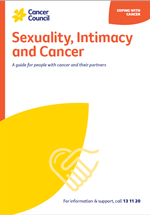- Home
- About Cancer
- Cancer treatment
- Radiation therapy
- Managing radiation therapy side effects
- Sexuality, intimacy and fertility issues
Sexuality, intimacy and fertility issues
Radiation therapy can affect your sexuality and fertility in emotional and physical ways. These changes are common. Some changes may be only temporary while others may be permanent.
Learn more about:
- Changes in sexuality
- Using contraception
- Changes in fertility
- Effects on fertility and sexual function
- Podcast: Sex and Cancer
Changes in sexuality
You may notice a lack of interest in sex or a loss of desire (libido), or you may feel too tired or unwell to want to be intimate. You may feel less sexually attractive to your partner because of changes to your body. All of these feelings are quite common. Although it is usually safe to have sexual intercourse, it may be uncomfortable, depending on where the radiation therapy is given. Talk to your doctor about ways to manage any side effects that change your sex life.
Using contraception
A woman’s eggs (ova) and a man’s sperm can be affected by very small amounts of radiation when having radiation therapy to any part of the body. Depending on the type of radiation therapy you have, your doctor may talk to you about using a barrier method of contraception (such as a condom or female condom). If pregnancy is possible, your doctor will advise you to avoid pregnancy by using contraception during radiation therapy and for at least 6 months after you have finished treatment. Talk to your doctor as soon as possible if pregnancy occurs.
Read personal stories from women who have been diagnosed with cancer while pregnant
Changes in fertility
The risk of infertility (difficulty getting pregnant or conceiving a child) will depend on the area treated, the dose of radiation and the number of treatment sessions. If you are treated with both radiation therapy and chemotherapy (chemoradiation), the risk of permanent infertility is higher.
Radiation therapy to the pelvic area, abdomen and sexual organs can affect your fertility, and this can be temporary or permanent. Radiation therapy to the brain can damage the pituitary gland, which controls the hormones the body needs to produce eggs or sperm.
If infertility is a potential side effect, your radiation oncologist will discuss it with you before treatment starts. Let them know if you think you may want to have children in the future. Ask what can be done to reduce the chance of problems and whether you should see a fertility specialist beforehand.
Sometimes, however, it is not possible to properly treat the cancer and maintain fertility. Many people feel a sense of loss when they learn they may no longer be able to have children. If you have a partner, talk to them about your feelings. Talking to a counsellor may also help.
For some ways to manage common impacts on your sex life and fertility, see Effect of radiation therapy on sex and fertility, and for more information, see Sexuality, intimacy and cancer and Fertility and cancer.
Radiation therapy can cause the skin or internal tissue in the treatment area to become less stretchy and harden. This is known as fibrosis. It can occur weeks or months after treatment and cause pain, lack of flexibility and narrowing of passages (such as the vagina, urethra or rectum). Let your treatment team know if you develop any new pain or stiffness, as early treatment can help.
→ READ MORE: Effects on sex and fertility
I didn’t really realise the radiation would affect my sexuality until it happened. I don’t think anyone can tell you what the pain, discomfort and exhaustion will do to you.
Donna
Podcast: Sex and Cancer
Listen to more of our podcast for people affected by cancer
More resources
A/Prof Susan Carroll, Senior Staff Specialist, Radiation Oncology, Royal North Shore Hospital, and The University of Sydney, NSW; Katie Benton, Advanced Dietitian Oncology, Sunshine Coast Hospital and Health Service, QLD; Adrian Gibbs, Director of Physics, Radiation Oncology, Princess Alexandra Hospital Raymond Terrace, QLD; Sinead Hanley, Consumer; Dr Annie Ho, Radiation Oncologist, GenesisCare, Macquarie University Hospital and St Vincent’s Hospital, NSW; Angelo Katsilis, Clinical Manager Radiation Therapist, Department of Radiation Oncology, Royal Adelaide Hospital, SA; Candice Kwet-On, 13 11 20 Consultant, Cancer Council Victoria; Jasmine Nguyen, Radiation Therapist, GenesisCare Hollywood, WA; Graham Rees, Consumer; Nicole Shackleton, Radiation Therapist, GenesisCare Murdoch, WA; Dr Tom Shakespeare, Director, Cancer Services, Mid North Coast Local Health District, NSW; Gabrielle Vigar, Nurse Lead, Cancer Program, Royal Adelaide Hospital and Queen Elizabeth Hospital, SA.
View the Cancer Council NSW editorial policy.
View all publications or call 13 11 20 for free printed copies.

